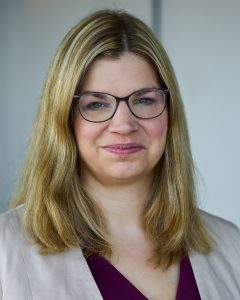Daria Lebert is Sales Manager and Nadja Peters heads the HR department at Cologne-based asset manager Flossbach von Storch. We want to know from both of them how young women today choose the company they want to work for and how companies are endeavouring to attract and retain employees in times of a shortage of skilled workers.
Daria, you are a Sales Manager at Flossbach von Storch. What exactly does your job involve?
I see my role as a link between portfolio management and in-house capital market strategy on the one hand and our sales partners in the wholesale segment on the other. To ensure that our sales partners such as banks, fund of funds managers, asset managers, IFAs and insurance companies are optimally equipped for client meetings and their own portfolio management, I provide support in the form of one-to-one meetings, adviser meetings and end client events. I attach great importance to long-term customer relationships rather than quick product sales.
 As a female sales manager, have you ever experienced a strange situation due to the fact that you are a woman? How did you resolve it?
As a female sales manager, have you ever experienced a strange situation due to the fact that you are a woman? How did you resolve it?
Fortunately not in recent years, but I still remember my start in the financial sector. Back then, I was still working for an independent broker and at my first event, I found myself one of three women in a room of 100 men. At the age of 23, with a colourful dress and blonde hair, I suddenly found myself unwantedly the centre of attention. I then started looking online for other female advisors and other women in the financial sector so that I could socialise and no longer feel so "alone". That's how I came to the Fondsfrauen.
You are a well-educated young woman. When you apply to a company, what criteria do you look for?
Fortunately, I don't have to think about changing jobs at the moment. If I ever did, a constructive error culture would be particularly important to me because it gives me the chance to improve, develop personally and innovate. I would also look for flat hierarchies because decision-making processes are shorter and faster, which I find very motivating. Good teamwork is also an important decision criterion.
Can you tell us which of these criteria your current employer - Flossbach von Storch - fulfils particularly well, and to what extent?
For us, this starts with an open and friendly culture, which can be felt by new employees from day one. This means that I can talk to my manager, but also to our board members, as equals. What also sets us apart is the fact that we have a lot of room for manoeuvre, for example when it comes to organising events and presentations. As a team, we have the opportunity to take time off from time to time to define common goals, but of course also to grow together.
 Nadja, as Head of HR, you are responsible for HR issues. The labour market is currently characterised by a shortage of skilled workers. In your opinion, what can companies do to create a good atmosphere internally, which also boosts employee morale and retention rates?
Nadja, as Head of HR, you are responsible for HR issues. The labour market is currently characterised by a shortage of skilled workers. In your opinion, what can companies do to create a good atmosphere internally, which also boosts employee morale and retention rates?
Nadja: By always having open ears and doors and being there for our employees, even if they don't feel so comfortable. We also actively support their further development - both professionally and personally. And we cultivate and strengthen the sense of community through joint events and activities.
What is the situation at Flossbach von Storch with regard to the proportion of women? How high is it overall, and how high is it at management level?
Nadja: The proportion of women at our company is over 30 per cent overall, including at management level. We are particularly pleased that over 40 per cent of all new hires in recent years have been women.
Is there a target figure that you would like to fulfil at a certain point in time?
Nadja: We don't have a fixed size. Our aim is to support those who have ambition and potential on their way to the top. However, there are areas in which we would like to see more female applicants, for example in portfolio management, in the analyst team and in IT.
What special funding opportunities does Flossbach von Storch offer? Are there any that are specifically for women?
Nadja: No, we are not making the cardinal error of personnel development here. That is: "fixing the women." Our approach is to change the system from within against the status quo. We therefore take great care to ensure that women - like men - can develop their strengths and potential in constructive cooperation. This has a lot to do with appreciation and solidarity as well as diversity of perspectives. In addition, we offer a wide range of promotion and support opportunities such as individual coaching and management development. Last but not least, we believe that our cooperation with the Fondsfrauen will also bear fruit.
Daria, which funding opportunities do you personally take advantage of and why do you find them suitable for you?
Daria: In addition to the freedom of being able to get involved with the Fondsfrauen, I recently took part in a four-day personal development training programme. Among other things, it covered topics such as self-perception and perception of others, trust instead of control and awareness of one's own responsibility in a corporate context.
What professional or career tips would you like to pass on to our readers?
Nadja: You may have heard that men often apply if they only fulfil 60 percent of the mandatory requirements. Some women, on the other hand, only consider themselves suitable when they fulfil 100 percent of the requirements - but it's different, because a requirement profile in a job advertisement is not a minimum requirement. So instead of sitting down and ticking off which requirements you fulfil, you should apply. It is important that you are enthusiastic about the job and can explain why you are the right person for it.
Daria: I can only encourage every woman not to shy away from the financial sector and to be courageous. Even if you don't realise it at first glance, we also have a lot of career changers working for us. For example, a trained mechanical engineer who now manages a fund, a colleague in HR who most recently managed a fitness centre but actually started her career as a trained electronics technician in the chemical industry. Sinologists, candle sellers and a person who almost became a professional tennis player. I myself also studied to be a teacher and only found my way into the financial sector via a diversion. Many more people should have the courage to try out this industry because, contrary to all preconceptions, working in the financial sector is very pleasant and Flossbach von Storch in particular goes to incredible lengths to close any gaps in knowledge internally.
Thank you both for this encouraging interview!



